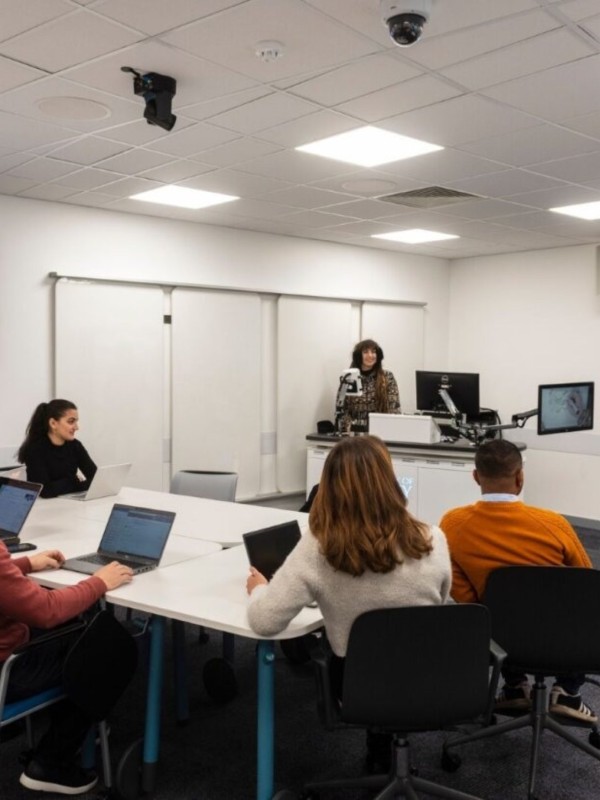
- Intercultural Business Communication and Marketing
MA — 2025 entry Intercultural Business Communication and Marketing
On this course you'll learn about the business of marketing, the role of language in internal and external communications as well as marketing in an international and cultural context. Develop the skills that will make you stand out to future employers.
Why choose
this course?
- Our course will enable you to develop an international and intercultural point of view and prepare you for a thriving career in linguistically and culturally diverse marketing and business environments.
- To work in an international marketing context you need to understand your audience and how to engage it. Our course combines the research and teaching strengths of Literature and Languages with the expertise of Surrey Business School, offering an exciting fusion of skills and experience that will accelerate your career.
- Over the years, our intercultural and professional communication courses have led graduates to develop careers in a variety of international organisations, - across advertising, international management, human resources, corporate communication and media and public relations.
- During your studies you’ll examine how the written word can influence how consumers make decisions and how to develop best practice for spoken communication in globalised business settings.
- Our staff are dedicated to their teaching and research and will support you as you become an international professional.
Statistics
Fantastic graduate prospects
97% of Literature and Languages postgraduate students go on to employment or further study (Graduate Outcomes 2024, HESA).
10th for research impact
The Research Excellence Framework (REF) 2021 ranked Literature and Languages 10th for research impact
4th in the UK
For Languages and Linguistics in the Guardian University Guide 2025
What you will study
On this course you’ll develop an understanding of effective marketing processes and how language can be used for effective business and marketing communication in an international context.
As part of your studies, you’ll complete a project evaluating the business, communication or marketing aspects of an organisation of your choice, which will enable you to apply your knowledge and skills in a practical context.
As an alternative, you can choose to write a practice-based dissertation based on a four-week internship. You’ll be responsible for securing your own internship, but you will be supported in your search by our Careers and Employability team.
You’ll learn how to apply cutting-edge research findings, practices and methods from the study of language to marketing practice, enhancing your career prospects, employability and essential skills for the workplace.
.
If studying part-time, you will study four modules each semester. You will also have three summer modules, including a self-study module during which you will write an extended project.
The structure of our programmes follows clear educational aims that are tailored to each programme. These are all outlined in the programme specifications which include further details such as the learning outcomes:
Modules
Modules listed are indicative, reflecting the information available at the time of publication. Modules are subject to teaching availability, student demand and/or class size caps.
The University operates a credit framework for all taught programmes based on a 15-credit tariff, meaning all modules are comprised of multiples of 15 credits, up to a maximum of 120 credits.
Course options
Year 1
Semester 1
Compulsory
This module is designed to provide MSc students with a rigorous theoretical framework for analysing and understanding Marketing in national and interantional contexts. Integrating theoretical concepts and models with practical application, students explore the contribution that Marketing can make to successful businesses and multi-national enterprises (MNEs) Theory and case studies from the UK and across the globe are used to analyse environmental conditions, marketing competition, consumer behaviour, marketing strategy, marketing planning, tactics and operations, and the growing influence of technology.
View full module detailsWorking in an international business and marketing environment entails working effectively with others, often across linguistic and cultural boundaries. This entails, for example, building effective working relationships and showing leadership. This module helps students develop the descriptive and analytical tools to analyse instances of spoken business communication. Students will also develop reflective abilities for inquiring into complex professional situations and identify solutions.
View full module detailsWorking in business and marketing related professions will often entail research, for example on customers' needs, employee satisfaction, etc. This module develops students' understanding of the principal qualitative and quantitative research methods and will provide them with opportunities to practice and apply these methods.
View full module detailsThis module provides students practical and theoretical knowledge of International Marketing in contexts, operations and strategies. It aims to develop students’ critical thinking and ability to apply and adapt theories to cases in international marketing.
View full module detailsSemester 2
Compulsory
Businesses communicate with customers in a variety of ways (e.g traditional advertising, social media and other forms of technology-mediated communication) and for a variety of purposes. This includes advertising, but also customer relations. This module helps students develop knowledge of, and skills in using the analytical tools for describing how businesses communicate with customers through a variety of media. Students will also learn how to use theoretical concepts and empirical evidence to support the design of customer-facing campaigns.
View full module detailsThis module will explore the concept of globalisation. It aims to equip students with a thorough theoretical and historical grasp of processes of globalisation – economic, political, and cultural – and highlight how this knowledge can inform and improve their own professional practice and awareness of the presence of globalisation discourses in everyday life. Theories and historical processes of globalisation will be presented and a wide range of relevant case studies (predominantly video-based and textual, drawing on journalistic and academic sources) will be critically examined through the lense of language. This will allow students to investigate how language relates to beliefs, values and ideologies of globalisation and to how language can be used to manipulate the public's views. Students will be asked to prepare some of these between seminars and group discussions will provide opportunities for feedback on this work.
View full module detailsConsumer Behaviour is evident in everyday life, therefore knowledge and understanding of this subject can be beneficial to personal decision-making as well as to marketing and strategy formulation, both in offline and online environments. The module Perspectives on Consumer Behaviour deals with a range of theoretical, practical techniques in understanding and researching consumer consumption behaviour and how such an understanding can be used to create successful and viable marketing strategies. This module gives students the opportunity to explore theories and leading-edge research findings and apply knowledge by conducting small group discussion and/or activities. Thus, reflective, and critical applications of relevant behavioural, cognitive, and socio-cultural approaches to consumption are discussed.
View full module detailsThis module introduces students to the key critical considerations and creative and technical decisions faced by translators of works in the cultural/creative industries, such as the film, theatre, creative or publishing industries. By focusing on the repertoires and creative decisions that such translation entails, the definition of ‘translation’ will be examined rather broadly, namely, both as a form of interlingual transfer and as a creative platform for (re)writing texts. Examples are offered from the areas of advertising, cultural heritage, tourism, performance (drama translation) and entertainment/art (children’s literature, comic books, films). The module is suitable for students with different language backgrounds and it offers a creative practical component as well as insights into how the creative industries work.
View full module detailsOptional
The Business Reporting Techniques module enables students to understand a research problem and source, process and conduct appropriate research while preparing a report on the problem. It facilitates independent learning process and provides them with the knowledge, skills and understanding required to articulate findings in a structured reporting format. By covering the fundamentals of reporting techniques and their applications, this module will enable students to work independently for the project module. This module expects students rely on almost everything they learn in the International Business Management Programme.
View full module detailsThis is a compulsory module for the MSc International Business Management programme. Being the final element of the programme, it provides an opportunity to conduct study on a real international business situation and reflect on it. Students will identify a topic area of interest that they wish to develop further through their project. This must be relevant to their programme of study. The module is largely based on self-directed study and research, which takes place during the summer. The learning strategy is designed to develop the students’ ability to conduce and report independent research. It builds on the Business Reporting Techniques module, allowing students to gain experience of applying some of the principles and methods learned. Students should build on the outcomes and feedback received in the Business Reporting Techniques module and develop a project – using secondary research – that demonstrates the successful understanding of the module’s aims and outcomes. The students will have opportunity to understand the techniques essential in writing business reports in the taught module “Business Reporting Techniques”. The project is unsupervised, which means you will not be assigned a supervisor. Instead, two support sessions will be conducted by the module leader to assist students to gain a comprehensive understanding of the requirements of the report.
View full module detailsThe world is increasingly complex and interconnected and there is a need to identify and manage the resulting hazards and risks (WEF, 2011). Business is facing unprecedented risks. The level of uncertainty and tensions resulting from climate change, pandemics, trade wars, geopolitics and just- in-time supply chains require the identification and strategic management of risk. A successful business manages its downside risks and takes advantage of opportunities resulting from upside risks. This module provides students with a fundamental understanding of uncertainty, hazards and risks required to succeed in business. Many of the increasing unanticipated commercial costs of risk are related to incomplete hazard identification (Goh and Chua, 2010). This course will provide you with an understanding of generic and operational risks of business, using research-led insight into the identification of risk, hazards, and uncertainty. The module facilitates learning through a combination of case studies and insight from practitioners and professionals in risk management. The course provides students with the opportunity to produce a Strategic Risk Management Report. Students work in groups to identify, analyse, and propose a risk management strategy for a corporate or public institution. Students will use the knowledge and skills gained from risk professionals and practitioner lectures, literature, frameworks, and real-world examples which are embedded in the module to produce a Strategic Risk Management report. The course equips students of management with key risk management skills to confidently communicate verbally and in written format risk management required for the strategic management of risk.
View full module detailsAcross academic years
Optional
This module is designed to enable students to consolidate and further advance the knowledge and skills acquired during the taught components of the programme, and gain experience working independently on an extended project through a work placement of at least 160 hours accompanied by a critical report. It is the responsibility of students to find a professional placement approved by the programme director. The programme director will support students in finding a placement by fostering engagement opportunities with Careers Services, supporting students with identifying and marketing their strengths and establishing contacts to businesses, if possible.
View full module detailsOptional modules for Year 1 (full-time) - FHEQ Level 7
Students will need to choose between the three summer optional modules, OR the Dissertation Module CMCM067
Year 1
Semester 1
Compulsory
This module is designed to provide MSc students with a rigorous theoretical framework for analysing and understanding Marketing in national and interantional contexts. Integrating theoretical concepts and models with practical application, students explore the contribution that Marketing can make to successful businesses and multi-national enterprises (MNEs) Theory and case studies from the UK and across the globe are used to analyse environmental conditions, marketing competition, consumer behaviour, marketing strategy, marketing planning, tactics and operations, and the growing influence of technology.
View full module detailsWorking in an international business and marketing environment entails working effectively with others, often across linguistic and cultural boundaries. This entails, for example, building effective working relationships and showing leadership. This module helps students develop the descriptive and analytical tools to analyse instances of spoken business communication. Students will also develop reflective abilities for inquiring into complex professional situations and identify solutions.
View full module detailsSemester 2
Compulsory
Businesses communicate with customers in a variety of ways (e.g traditional advertising, social media and other forms of technology-mediated communication) and for a variety of purposes. This includes advertising, but also customer relations. This module helps students develop knowledge of, and skills in using the analytical tools for describing how businesses communicate with customers through a variety of media. Students will also learn how to use theoretical concepts and empirical evidence to support the design of customer-facing campaigns.
View full module detailsConsumer Behaviour is evident in everyday life, therefore knowledge and understanding of this subject can be beneficial to personal decision-making as well as to marketing and strategy formulation, both in offline and online environments. The module Perspectives on Consumer Behaviour deals with a range of theoretical, practical techniques in understanding and researching consumer consumption behaviour and how such an understanding can be used to create successful and viable marketing strategies. This module gives students the opportunity to explore theories and leading-edge research findings and apply knowledge by conducting small group discussion and/or activities. Thus, reflective, and critical applications of relevant behavioural, cognitive, and socio-cultural approaches to consumption are discussed.
View full module detailsOptional
The world is increasingly complex and interconnected and there is a need to identify and manage the resulting hazards and risks (WEF, 2011). Business is facing unprecedented risks. The level of uncertainty and tensions resulting from climate change, pandemics, trade wars, geopolitics and just- in-time supply chains require the identification and strategic management of risk. A successful business manages its downside risks and takes advantage of opportunities resulting from upside risks. This module provides students with a fundamental understanding of uncertainty, hazards and risks required to succeed in business. Many of the increasing unanticipated commercial costs of risk are related to incomplete hazard identification (Goh and Chua, 2010). This course will provide you with an understanding of generic and operational risks of business, using research-led insight into the identification of risk, hazards, and uncertainty. The module facilitates learning through a combination of case studies and insight from practitioners and professionals in risk management. The course provides students with the opportunity to produce a Strategic Risk Management Report. Students work in groups to identify, analyse, and propose a risk management strategy for a corporate or public institution. Students will use the knowledge and skills gained from risk professionals and practitioner lectures, literature, frameworks, and real-world examples which are embedded in the module to produce a Strategic Risk Management report. The course equips students of management with key risk management skills to confidently communicate verbally and in written format risk management required for the strategic management of risk.
View full module detailsOptional modules for Year 1 (part-time) - FHEQ Level 7
Students will need to choose between the three summer optional modules, OR the Dissertation Module CMCM067
Year 2
Semester 1
Compulsory
Working in business and marketing related professions will often entail research, for example on customers' needs, employee satisfaction, etc. This module develops students' understanding of the principal qualitative and quantitative research methods and will provide them with opportunities to practice and apply these methods.
View full module detailsThis module provides students practical and theoretical knowledge of International Marketing in contexts, operations and strategies. It aims to develop students’ critical thinking and ability to apply and adapt theories to cases in international marketing.
View full module detailsSemester 2
Compulsory
This module will explore the concept of globalisation. It aims to equip students with a thorough theoretical and historical grasp of processes of globalisation – economic, political, and cultural – and highlight how this knowledge can inform and improve their own professional practice and awareness of the presence of globalisation discourses in everyday life. Theories and historical processes of globalisation will be presented and a wide range of relevant case studies (predominantly video-based and textual, drawing on journalistic and academic sources) will be critically examined through the lense of language. This will allow students to investigate how language relates to beliefs, values and ideologies of globalisation and to how language can be used to manipulate the public's views. Students will be asked to prepare some of these between seminars and group discussions will provide opportunities for feedback on this work.
View full module detailsThis module introduces students to the key critical considerations and creative and technical decisions faced by translators of works in the cultural/creative industries, such as the film, theatre, creative or publishing industries. By focusing on the repertoires and creative decisions that such translation entails, the definition of ‘translation’ will be examined rather broadly, namely, both as a form of interlingual transfer and as a creative platform for (re)writing texts. Examples are offered from the areas of advertising, cultural heritage, tourism, performance (drama translation) and entertainment/art (children’s literature, comic books, films). The module is suitable for students with different language backgrounds and it offers a creative practical component as well as insights into how the creative industries work.
View full module detailsOptional
The Business Reporting Techniques module enables students to understand a research problem and source, process and conduct appropriate research while preparing a report on the problem. It facilitates independent learning process and provides them with the knowledge, skills and understanding required to articulate findings in a structured reporting format. By covering the fundamentals of reporting techniques and their applications, this module will enable students to work independently for the project module. This module expects students rely on almost everything they learn in the International Business Management Programme.
View full module detailsThis is a compulsory module for the MSc International Business Management programme. Being the final element of the programme, it provides an opportunity to conduct study on a real international business situation and reflect on it. Students will identify a topic area of interest that they wish to develop further through their project. This must be relevant to their programme of study. The module is largely based on self-directed study and research, which takes place during the summer. The learning strategy is designed to develop the students’ ability to conduce and report independent research. It builds on the Business Reporting Techniques module, allowing students to gain experience of applying some of the principles and methods learned. Students should build on the outcomes and feedback received in the Business Reporting Techniques module and develop a project – using secondary research – that demonstrates the successful understanding of the module’s aims and outcomes. The students will have opportunity to understand the techniques essential in writing business reports in the taught module “Business Reporting Techniques”. The project is unsupervised, which means you will not be assigned a supervisor. Instead, two support sessions will be conducted by the module leader to assist students to gain a comprehensive understanding of the requirements of the report.
View full module detailsAcross academic years
Optional
This module is designed to enable students to consolidate and further advance the knowledge and skills acquired during the taught components of the programme, and gain experience working independently on an extended project through a work placement of at least 160 hours accompanied by a critical report. It is the responsibility of students to find a professional placement approved by the programme director. The programme director will support students in finding a placement by fostering engagement opportunities with Careers Services, supporting students with identifying and marketing their strengths and establishing contacts to businesses, if possible.
View full module detailsOptional modules for Year 2 (part-time) - FHEQ Level 7
Students will need to choose between the three summer optional modules, OR the Dissertation Module CMCM067
General course information
Contact hours
Contact hours can vary across our modules. Full details of the contact hours for each module are available from the University of Surrey's module catalogue. See the modules section for more information.
Timetable
Course timetables are normally available one month before the start of the semester.
New students will receive their personalised timetable in Welcome Week, and in subsequent semesters, two weeks prior to the start of semester.
Please note that while we make every effort to ensure that timetables are as student-friendly as possible, scheduled teaching can take place on any day of the week (Monday – Friday). Wednesday afternoons are normally reserved for sports and cultural activities. Part-time classes are normally scheduled on one or two days per week, details of which can be obtained from Academic Administration.
Location
This course is based at Stag Hill campus. Stag Hill is the University's main campus and where the majority of our courses are taught.
We offer careers information, advice and guidance to all students whilst studying with us, which is extended to our alumni for three years after leaving the University.
Under the guidance of our internationally renowned academics, you'll learn how to look at issues in marketing and advertising from an interdisciplinary and intercultural perspective. You’ll improve your versatility in planning marketing and communication campaigns and become a global professional.
With an MA in Intercultural Business Communication and Marketing, you'll acquire specialist professional skills which will separate you from the crowd and enable you to enhance your profile for new and exciting career opportunities.
94 per cent of our Surrey Business School postgraduate students and 97 per cent of our Literature and Languages postgraduate students go on to employment or further study (Graduate Outcomes 2024, HESA).
Our graduates have gone on to successful careers in a variety of international organisations, particularly in business functions such as advertising, international management, human resources, corporate communication and media and public relations.
Specific roles in these industries include:
- Content co-ordinator
- Marketing manager
- Business development executive
- Internal communications manager
- Wealth and personal banker
- Content editor
- Talent partnerships manager
- Senior business development executive
- Advertising and digital communication manager
- Content and digital marketing assistant.
Other possible career paths include intercultural coaching and consultancy, and market analysis and strategy development.


Lisa Cosham
Student - Intercultural Business Communication and Marketing MA
"If I could go back and do my years at Surrey again, I would. Everything. The whole rollercoaster. I wouldn’t trade my time there for anything!"


Negar
Student - Intercultural Business and Communication MA
This course is teaching much more than just words and definitions. This course is a combination of the practical knowledge a person needs to find their way in society. The more you improve your communication skills the closer you get to success.
UK qualifications
A minimum of a 2:2 UK honours degree in any subject, or a recognised equivalent international qualification.
We may be able to take relevant work experience into consideration if you don't meet these requirements. If you have at least one year of relevant experience in a full-time graduate-level role (or a minimum of two years’ experience in a relevant graduate-level part-time role) please provide full details of your role and responsibilities in your personal statement and CV when you submit your application.
English language requirements
IELTS Academic: 6.5 overall with 6.5 in writing and 6.0 in each other element.
These are the English language qualifications and levels that we can accept.
If you do not currently meet the level required for your programme, we offer intensive pre-sessional English language courses, designed to take you to the level of English ability and skill required for your studies here.
Recognition of prior learning
We recognise that many students enter their course with valuable knowledge and skills developed through a range of ways.
If this applies to you, the recognition of prior learning process may mean you can join a course without the formal entry requirements, or at a point appropriate to your previous learning and experience.
There are restrictions for some courses and fees may be payable for certain claims. Please contact the Admissions team with any queries.
Scholarships and bursaries
Discover what scholarships and bursaries are available to support your studies.
Fees per year
Explore UKCISA’s website for more information if you are unsure whether you are a UK or overseas student. View the list of fees for all postgraduate courses.
September 2025 - Full-time - 1 year
- UK
- £10,900
- Overseas
- £21,800
September 2025 - Part-time - 2 years
- UK
- £5,500
- Overseas
- £10,900
- If you are on the two-year part-time masters programme, the annual fee is payable in Year 1 and Year 2 of the programme
- These fees apply to students commencing study in the academic year 2025-26 only. Fees for new starters are reviewed annually.
Payment schedule
- Students with Tuition Fee Loan: the Student Loans Company pay fees in line with their schedule (students on an unstructured self-paced part-time course are not eligible for a Tuition Fee Loan).
- Students without a Tuition Fee Loan: pay their fees either in full at the beginning of the programme or in two instalments as follows:
- 50% payable 10 days after the invoice date (expected to be October/November of each academic year)
- 50% in January of the same academic year.
- Students on part-time programmes where fees are paid on a modular basis: cannot pay fees by instalment.
- Sponsored students: must provide us with valid sponsorship information that covers the period of study.
The exact date(s) will be on invoices.
Additional costs
Books/stationery/admin: £100 - £150.
Funding
You may be able to borrow money to help pay your tuition fees and support you with your living costs. Find out more about postgraduate student finance.
Apply online
To apply online first select the course you'd like to apply for then log in.
Select your course
Choose the course option you wish to apply for.
Sign in
Create an account and sign into our application portal.
Please note that we may have to close applications before the stated deadline if we receive a high volume of suitable applications. We advise you to submit your application as soon as it is ready.
ApplyPlease note that we may have to close applications before the stated deadline if we receive a high volume of suitable applications. We advise you to submit your application as soon as it is ready.
ApplyAdmissions information
Once you apply, you can expect to hear back from us within 14 days. This might be with a decision on your application or with a request for further information.
Our code of practice for postgraduate admissions policy explains how the Admissions team considers applications and admits students. Read our postgraduate applicant guidance for more information on applying.
About the University of Surrey
Need more information?
Contact our Admissions team or talk to a current University of Surrey student online.
Terms and conditions
When you accept an offer to study at the University of Surrey, you are agreeing to follow our policies and procedures, student regulations, and terms and conditions.
We provide these terms and conditions in two stages:
- First when we make an offer.
- Second when students accept their offer and register to study with us (registration terms and conditions will vary depending on your course and academic year).
View our generic registration terms and conditions (PDF) for the 2024/25 academic year, as a guide on what to expect.
Disclaimer
This online prospectus has been published in advance of the academic year to which it applies.
Whilst we have done everything possible to ensure this information is accurate, some changes may happen between publishing and the start of the course.
It is important to check this website for any updates before you apply for a course with us. Read our full disclaimer.






